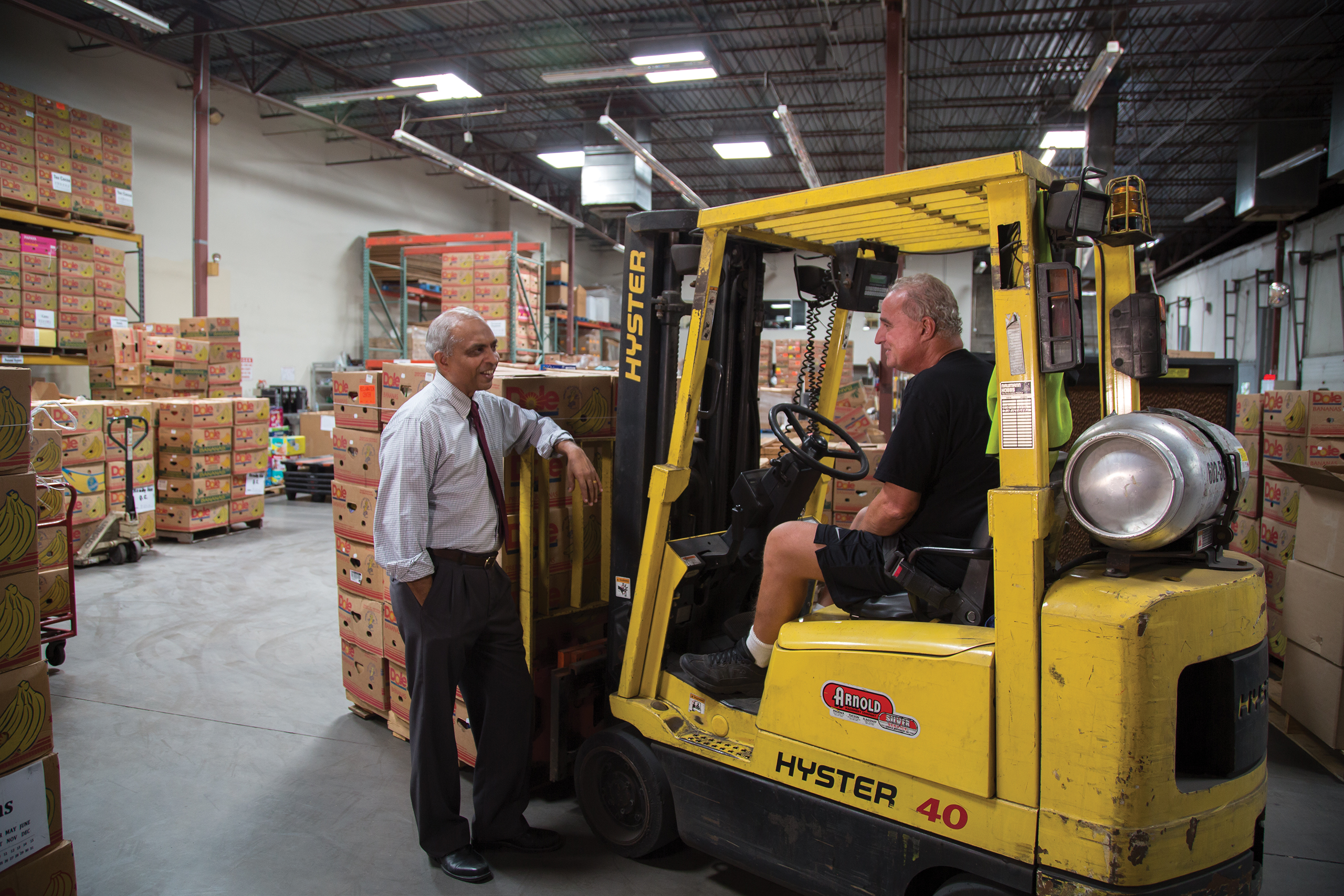
A chain of heart
How logistics experts helped a nonprofit feed the hungry faster and at a lower cost.
“Free 2-hour delivery,” reads a digital banner featuring produce, dairy, beverages, snacks, and canned items available to Phoenix residents at the click of a button.
Seven hours away by plane, in Caracas, Venezuela, lines snake outside bakeries where people wait overnight for bread, emblematic of a population bordering on starvation because groceries don’t arrive on time — or at all.
In both places, convenience and catastrophe verge on a web of raw materials, goods, transportation systems, and organizations that make up the supply chain — a sequence of processes that Arizona State University researchers are working to optimize on all spectrums.
“We talk about Amazon on one end, and then we look at some of the developing or underdeveloped economies where basic food and medicine access and reach is still a challenge,” says Mohan Gopalakrishnan, associate professor and department chair of supply chain management. “We’re continuously learning and applying what we’re learning in some economies to others to improve them.”
Gopalakrishnan and his colleagues’ studies span a range of industries — from big-box retailers to health care operators — while focusing on a common question: How can organizations mitigate risk in the supply chain?
Cybersecurity hacks are one kind of risk, as are natural disasters. So, too, are logistics risks — such as when pirates demanding ransom led shipping companies to take longer routes — and man-made risks — such as when governments aren’t willing to cooperate with humanitarian aid efforts.
Loss can also come from inefficiencies — something Gopalakrishnan, Associate Professor of Economics Philip Mizzi, and Associate Professor of Supply Chain Management Srimathy Mohan identified at a local charitable organization that feeds the hungry. With a grant from Motorola Solutions, they were able to bring in students and additional faculty to improve them.
When local supermarkets consolidated, donations to the Society of St. Vincent de Paul of Arizona (SVdP) increased by 12-fold and the group’s warehouse couldn’t keep up. Supplies, up to 20 percent of them, went to waste at the same time the recession amplified food insecurity. The SVdP board was considering investing in a new facility to process and store its goods.
[It was the] perfect place where a university steps in and helps out.
— Gopalakrishnan
The SVdP’s logistics challenges are complex: It receives a million pounds of food each year, but provisions arrive at inconsistent intervals, often propelled by corporate or holiday drives. On days that truckloads arrive, staff and volunteers must sort and scan their contents, discard damaged items, and expedite those close to expiration. Then, materials are distributed to dining halls and food pantries around the state while adjustments are made to accommodate refrigeration capacity and each pantry's need for specific items.
At every step, Gopalakrishnan, Mizzi, Mohan, and their team made adjustments.
“We made them operate more smartly. We used temporary trailers because all the food didn’t come at the same time,” says Gopalakrishnan. “We’re proud to say that they did not build the warehouse, they’ve increased the volume many more times and have become extremely efficient in handling food.”
Stephen Zabilski, executive director of SVdP, says the non-profit has a responsibility to be good stewards of community assets and donors’ gifts, something the ASU researchers enabled.
“It literally saved St. Vincent de Paul hundreds of thousands of dollars, if not more,” he says. “Every single time I walk into that warehouse I think of what we might be doing if ASU had not brought their expertise.”
Gopalakrishnan called the project a “win-win,” saying “The students learned, we published, the food that was delivered improved, more mouths were fed. In all aspects, this became a success story for us.”
The scholars’ learnings continue to be applied at other humanitarian service providers, including impoverished areas in India.
Yet, despite advances in understanding and technologies that redefine expectations for the speedy delivery of goods, supply chains can break, and hunger remains an issue.
Thankfully, private donors continue to support work in the field. In November 2017, with new funding from Knight-Swift Transportation, the W.P. Carey School opened the Knight-Swift Logistics Lab on ASU’s West Campus. It provides a platform for learning and real-world simulation to fortify supply chains — especially when it comes to issues of practical importance.
“We’re grateful for the support of businesses and humanitarian groups that come to the university to solve problems. Here, information is collected with an open mind, and knowledge is created by working across disciplines,” says W.P. Carey School of Business Dean Amy Hillman. “The work of these scholars is humbling, but there’s more to be done. And we’re eager to do it.”
To learn more about W. P. Carey's supply chain management program and support research in humanitarian logistics, contact the development team at [email protected].
Latest news
- The hobby effect: Why showing your personal side can pay off professionally
A new study finds that sharing hobbies tied to growth and fulfillment can make people appear…
- How custom AI bots are changing the classroom
Faculty share cutting-edge AI tools enhancing student learning at the business school.
- Entrepreneurship and innovation master's degree helped Prudence Zhu achieve her goal of building personable financial planning business
Prudence Zhu's (MS-EI '22) desire to build a more human-based, accessible financial services…